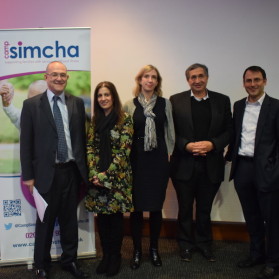


Over 100 people came to our recent event to find out more about Crohn’s and Colitis and especially how they can affect young people.
We brought together some of the best experts in this area including, Dr Clive Onnie, Consultant Gastroenterologist who spoke on the latest treatment options, risks and benefits, Dr Julian Stern, Consultant Psychiatrist who spoke about how coping with chronic illness can affect family dynamics, Dr Sara McCartney, Consultant Gastroenterologist who covered the specific challenges in young people with IBD and dietitian, Naomi Joseph, who answered the questions, Is there a specific diet that works for IBD?
We are always keen to raise awareness of the effects of serious illnesses and to meet families that we can support going forward.
One parent who attended the event is mother to a teenage boy, who was diagnosed with Crohn’s 18 months ago.
“We saw the doctor after the summer because he had been in so much pain in the holidays. He was scanned and diagnosed very quickly but it was still a shock. In hindsight, there had been signs – he used to be one of the tallest out of his friends and then suddenly he was the smallest and my husband’s sister also has Crohn’s – but it just hadn’t occurred to us until he started to be in pain.
“He was put on a liquid diet for 6 weeks and one of the hardest parts of that was that he had just started secondary school, so he didn’t want to stand out as different. He was treated with various drugs, some of which made him ill, but then went on to immune-suppressants. These took several months to work but once they did he went into remission.
“However, the problem was that – as the name suggests – they impact the immune system – so that summer he caught dysentery while we are away in Israel which turned into E-Coli. For the next 3-4 months he was really poorly and was off school quite a bit, which was incredibly difficult academically and socially for him. He really felt very isolated – like he was missing out.
“Thankfully things have been better since December, but we really have had to stress the importance of washing hands and he has to take responsibility for that because we can’t be there with him at school.”
Dr McCartney talked to parents in the audience about the issues that can arise as teenagers get older and need and want to take control of their own health.
“Sometimes parents are a bit resistant to their changing role and I have had a few teenagers asking parents to just sit outside for a while because they don’t want their parents to make all the decisions.
“However, there is evidence that patients transferring to adult services from paediatric don’t always do well especially with things like taking their medication. You see a lot of disease flair and non-adherence to medication.
“What we try to do in the Transition clinic is try to train them so they can manage their disease once they get to the stage where they need to do it by themselves. We find the nurse specialists are key because they can email they can get in touch with them and get advice very quickly.”
If your child has IBD and you would like more information on support you can contact us or Jewish Digest